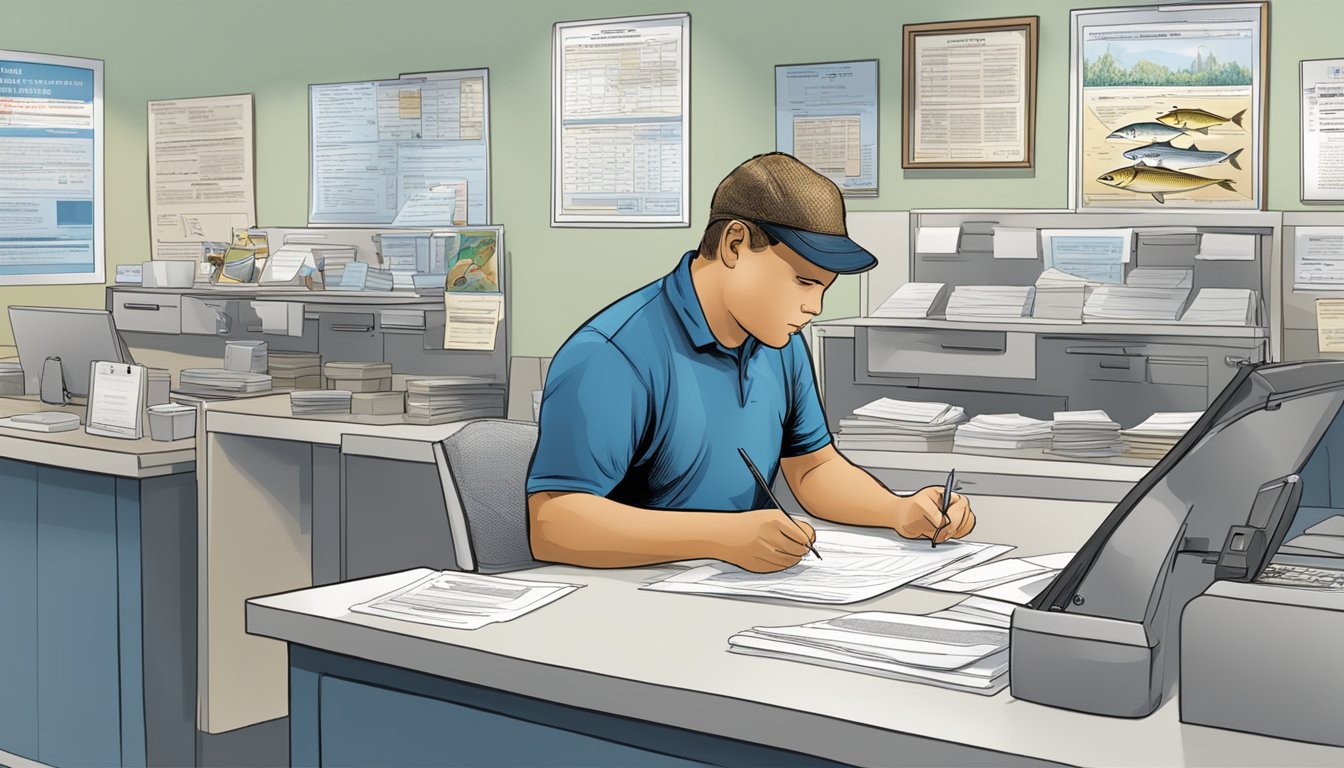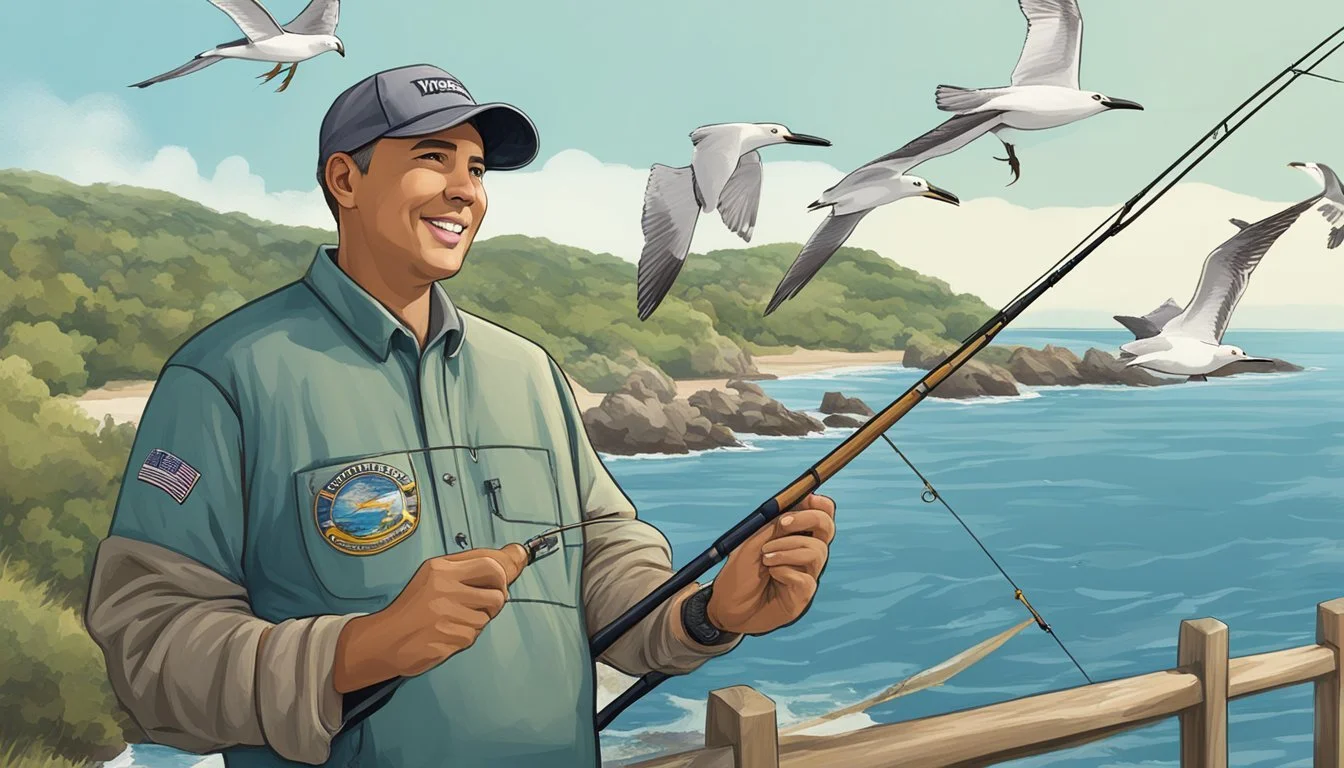How to Get a Virginia Saltwater Fishing License
Your Essential Guide
Anglers looking to enjoy the abundant saltwater fishing opportunities in Virginia will need a recreational fishing license. The Commonwealth of Virginia mandates a license for saltwater anglers over the age of 16 to help manage fisheries and protect the marine environment. These licenses are issued by the Virginia Department of Wildlife Resources and are available with varying terms, including annual, temporary, or lifetime licenses depending on the needs of the fisherman.
Fishing licenses are easily accessible and can be obtained both online and in person. For added convenience, Virginia also offers free reprints of licenses 24/7 through their online system. It is important for fishermen to familiarize themselves with the various fees, as these differ for residents and non-residents of Virginia. Additionally, Virginia offers specific recreational species permits, such as the no-cost permit for the black sea bass season, which may require fisherman to report their harvest to the commission.
Certain groups, such as students attending school in Virginia, may be eligible for special licensing privileges. Furthermore, there exist some exceptions to the licensing requirements under specific conditions. These details underscore the importance of understanding the nuanced regulations governing saltwater fishing in Virginia to ensure a legal and enjoyable angling experience.
Understanding Virginia Fishing Licenses
Virginia offers specific licensing options for anglers, tailored to the type of water and species fished, with distinct regulations and categories for residents and non-residents.
Distinction Between Freshwater and Saltwater Licenses
In Virginia, there is a clear distinction between freshwater and saltwater fishing licenses. A freshwater fishing license allows anglers to fish (What wine goes well with fish?) in non-tidal waters, while a saltwater fishing license is required for fishing in tidal waters. Residents and non-residents must ensure they have the appropriate license based on their fishing location.
Regulations Governing Saltwater Licenses
Regulations for saltwater fishing licenses in Virginia are managed by the Virginia Marine Resources Commission (VMRC). Anglers must comply with the specific regulations, such as registration requirements and species permits. For example, some recreational fisheries like the February black sea bass season might need a no-cost permit for participation.
Categories of Fishing Licenses
Virginia offers various fishing license categories, including:
Resident Fees: Lower cost licenses for Virginia residents.
Nonresident Fees: Licensing options available to non-residents at a different rate.
Miscellaneous Fees: Licenses for specific situations or groups, such as disabled anglers.
Lifetime Licenses: One-time purchase licenses that cover the holder’s lifetime.
Anglers should select their license based on their residency status and how long they plan to fish (What wine goes well with fish?) in Virginia waters. It's essential to carry the recreational fishing license while fishing to comply with state requirements.
Eligibility and Requirements
Obtaining a Virginia saltwater fishing license requires an understanding of various categories of eligibility and documentation. The requirements differentiate between resident and non-resident anglers, cover age and special exceptions, and specify the necessary identification for a successful application.
Resident vs. Non-Resident Licenses
Residents of Virginia are eligible to apply for a resident fishing license. Residents are typically defined as individuals who have lived in Virginia for a consecutive six-month period, maintain a permanent place of residence in the state, and are legal voters or plan to vote in Virginia. Non-residents, those who do not meet these criteria, must apply for a non-resident license to fish in Virginia waters.
Age, Disability, and Veterans' Exceptions
Individuals under 16 years old do not require a license to fish in Virginia. Those who are 65 or older can opt for a no-fee registration instead of a traditional fishing license, yet they must adhere to the Fisherman Identification Program (FIP) annual registration to fish in tidal waters. Disabled license holders and veterans may be eligible for reduced fees or exemptions, emphasizing the importance of verifying individual circumstances with Virginia's Department of Wildlife Resources.
Identification and Documentation Needed
Applicants must present valid identification when applying for a license. Accepted forms of identification include a state-issued driver's license or identification card, military ID, passport, or other government-issued photo identification. Additionally, proof of residency (such as a utility bill or lease agreement) is necessary for residents. Documentation related to disability status or military service is required when applying for any exceptions or discounted licenses.
How to Purchase a License
Virginia offers several convenient methods for purchasing a saltwater fishing license, ensuring anglers can easily comply with the state's licensing requirements. Whether through online registration, in-person visits, or mail-in applications, anglers have multiple options to secure their license.
Online Portal for License Registration
Anglers can register for a Virginia saltwater fishing license via the Go Outdoors Virginia website. The online portal facilitates both new registrations and renewals. Customers need to create a customer account, providing a streamlined process for all future transactions. The following steps outline the online registration process:
Visit the official Go Outdoors Virginia website.
Click on the 'Fishing' section.
Select the appropriate license type.
Create or log into your customer account.
Complete the application details.
Pay the license fee with a credit or debit card.
Print out the proof of license purchase.
Visiting License Agents and Agencies
Purchasing a license in person is another option for anglers who prefer direct interaction. License agents located throughout Virginia, including at retail stores, outdoor sporting goods stores, and specific circuit court offices, provide this service. To find a local license agent, individuals can:
Use the Go Outdoors Virginia website to search for nearby agents.
Look for official signs indicating that a location is an authorized license agent.
Visit a circuit court that offers licensing services.
Mail-In and In-Person Options
For those who prefer mail-in or manual purchase, the following methods are available:
Mail-In: Complete the appropriate forms and mail them with payment to the address provided by Virginia’s Department of Wildlife Resources. This information can be obtained on the Go Outdoors Virginia website or by contacting customer service.
In-Person: Check for any Virginia Department of Wildlife Resources offices or authorized licensing agencies that provide counter service for walk-in customers.
It is essential to check the specific requirements and opening hours of these locations before making a visit, as services may vary.
Types of Licenses
In Virginia, anglers must select the appropriate license based on the duration of the activity, specific species targeted, and whether they are fishing from a boat or pier.
Short-term and Annual Licenses
Virginia offers a variety of licenses to accommodate both short-term visitors and avid anglers looking for longer-term options. Individuals can purchase a 1-day freshwater fishing license or opt for a 5-day fresh/saltwater fishing license ideal for a short vacation. For those planning to fish in the saltwater regions of Virginia, there is a 10-day saltwater fishing option available. Residents who frequently enjoy the sport may find the annual or lifetime saltwater fishing licenses more economical and convenient.
Special Permits and Species Licenses
Certain species require additional permits. For example, anglers targeting trout need to obtain a separate trout license to legally fish for this species. It's important to check specific requirements for any targeted species or particular areas when purchasing your license.
Boat and Pier Licensing
Anglers fishing from a boat have additional licensing options. A tidal boat sport fishing license allows everyone on board a privately-owned vessel to fish without needing individual licenses. Similarly, those fishing from a licensed fishing pier are covered and do not need individual licenses. For charter boats, a separate charter boat license is required, which then covers the passengers as well.
Recognizing Exemptions and Special Cases
In Virginia, some individuals are exempt from the requirement to hold a saltwater fishing license under specific legal and age-related conditions. This recognition helps ensure compliance without unnecessary burdens on certain groups of anglers.
Legal and Age-related Exemptions
The Commonwealth of Virginia acknowledges that not all residents and visitors need to purchase a saltwater fishing license. Legal exemptions include:
Individuals under the age of 16.
Residents aged 65 and above.
Additionally, some special groups are exempt:
Legally blind individuals can fish without a license.
Native Americans fishing on their own property are not required to have a license.
Special Considerations for Unique Areas
Certain waterways and fishing areas in Virginia may have unique regulations that provide exceptions to the typical licensing requirements. For instance:
Anglers fishing on licensed pay-fishing ponds.
Those casting lines from licensed charter boats.
Note: All anglers should double-check area-specific rules before assuming any exceptions apply, as regulations can change.
Virginia Fisherman Identification Program
The Virginia Fisherman Identification Program (FIP) is a mandatory system for anglers that exempts them from needing a Virginia saltwater fishing license under certain conditions. It ensures they are accounted for in surveys and studies for fishery management purposes.
Registration and Compliance
Individuals fishing in Virginia tidal waters who are exempt from the state's saltwater license requirements must register with the Virginia Fisherman Identification Program. Registration is crucial for compliance and can be completed conveniently through VMRC Mobile or online via a designated portal. Upon registration, anglers receive a unique FIP number which should be carried and produced upon request by enforcement officers or any authorized personnel.
FIP vs. Licensing Requirements
It’s important to differentiate between the FIP registration and Virginia saltwater fishing licensing. The FIP caters to individuals exempt from the standard license mandate, mostly due to age or type of catch. Conversely, many anglers will still necessitate a formal fishing license, which mandates carrying a physical or electronic copy at all times whilst fishing. Those who are unsure of their status should consult the Virginia Marine Resources Commission to understand and adhere to state regulations.
Additional Resources and Information
When pursuing a saltwater fishing adventure in Virginia, anglers need to be aware of various guidelines, access points, and conservation initiatives. Resources provided by the Virginia Marine Resources Commission (VMRC) and the Department of Wildlife Resources (DWR) offer extensive information on these aspects to ensure a well-informed fishing experience.
State and National Park Fishing Guidelines
Virginia's state forests and national forests are home to numerous fishing opportunities. Regulations can vary depending on the specific park or forest area. Anglers should consult DWR and VMRC for fishing regulations that apply within these jurisdictions. It's important to verify whether the area falls under the National Saltwater Angler Registry and adhere to any additional guidelines mandated for fishing in these protected areas.
Access to Fishing Boats and Ramps
Access to fishing by boat is critical for saltwater anglers. Private boat owners can find numerous boat ramps throughout Virginia's coast provided by DWR. These ramps enable anglers to launch into various bodies of water, including sites near artificial reefs. For those without their own boat, local charters and rentals are an option—many of which include registration with the National Saltwater Angler Registry as part of their services.
Conservation Efforts and Artificial Reefs
The creation of artificial reefs has been an integral part of Virginia's conservation efforts, enhancing fish habitats and increasing the richness of the marine environment. A list of artificial reef locations and guidelines for fishing around these important conservation sites is available through the VMRC. This includes the types of materials used and GPS coordinates for reef sites. Anglers are encouraged to be mindful of conservation practices and to contribute to the sustainability of Virginia's vibrant marine life.







